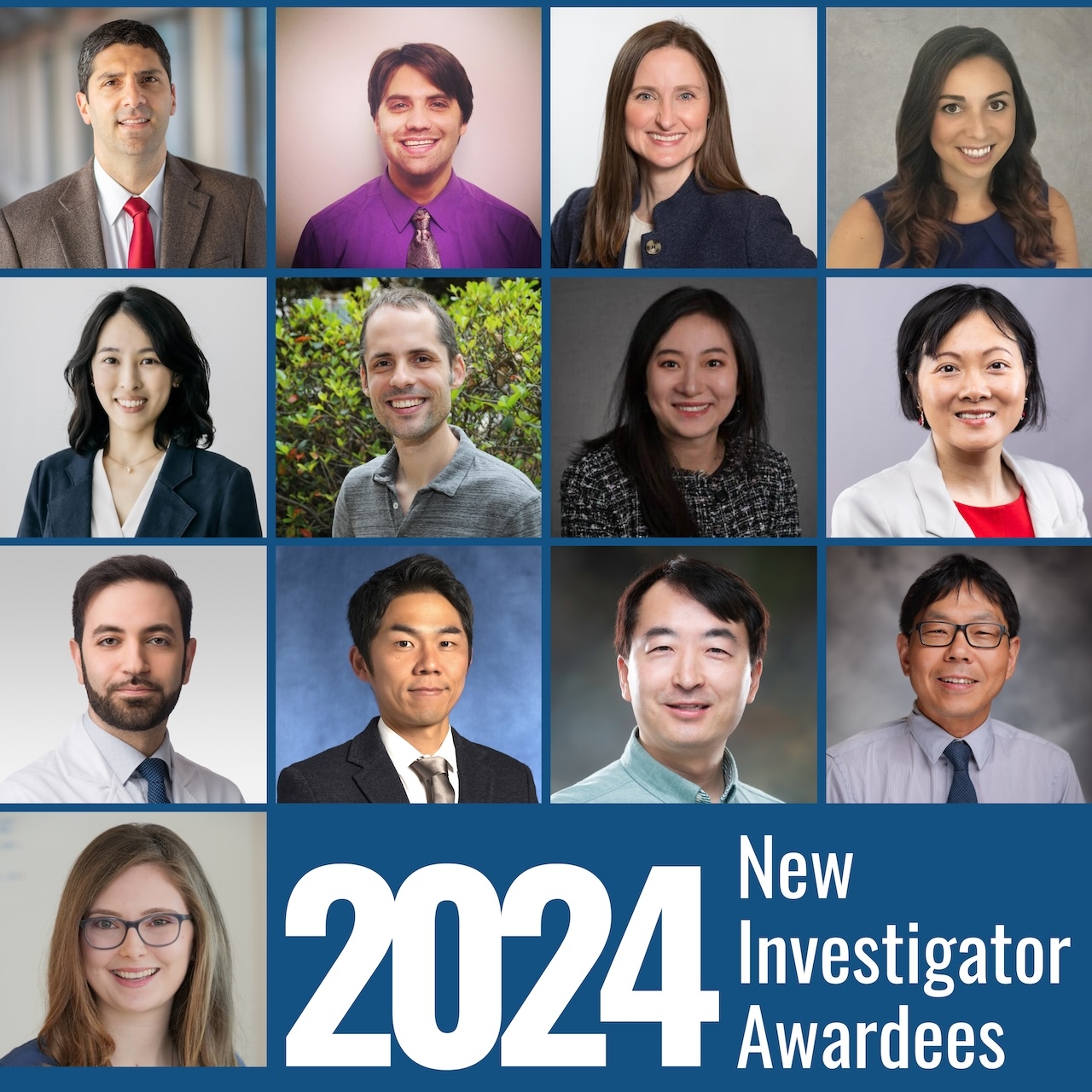2024 New Investigator Award Winners

The National Alzheimer’s Coordinating Center (NACC) and the Alzheimer’s Association are pleased to announce the 2024 New Investigator Award winners. This newly expanded program is dedicated to mentoring and funding early career investigators focused on advancing Alzheimer’s disease and related dementias discovery and translation.
This year, 13 awardees from across the National Institute of Aging’s (NIA) Alzheimer’s Disease Research Centers program will receive $135,000 in direct costs to support their proposed projects focused on tackling a range of pressing challenges in the field.
"We are delighted to partner with the Alzheimer’s Association to expand the program from two to 13 awards that support the career development of new investigators, I am excited to see how the Program propels these early investigators to advance our understanding of Alzheimer’s."
NACC is funded by NIA and serves as the centralized data repository and collaboration, and communication hub for NIA’s Alzheimer’s Disease Research Centers program, which encompasses 37 centers across the United States. The Alzheimer’s Association is the world’s largest non-profit funder of Alzheimer’s and all dementia science, with over $360 million in funding committed today to over 1,000 projects in 53 countries.
"Supporting early career investigators studying Alzheimer’s disease and related dementias is a core tenant of the missions of NACC and the Alzheimer’s Association. There was a great opportunity to synergize our efforts to expand and amplify this program’s impact, we look forward to growing this partnership in the coming years to support even more early investigators."
This year, the 13 researchers were chosen from the largest applicant pool in the program’s history, which included 154 eligible proposals across 34 Centers, representing a 357 percent increase in application submissions from previous years. The winners also represent 13 unique Centers and institutions across the United States.
Through a partnership with the Research Education Component (REC), applicants could also participate in a mentorship program to aid them with their applications. Seventy seven percent of applicants participated in the program and were matched with a mentor. Roughly 85 percent of the 13 awardees participated in the mentorship program and 92 percent of mentees reported that this mentorship would also be valuable for future grant applications.
"We are thrilled to partner with NACC to fund early career investigators studying Alzheimer’s and dementia research, each project demonstrates great promise for improving the scientific understanding of these diseases, while encouraging new investigators to pursue novel discoveries."
The 2024 winners are:
Claire Clelland, MD, PhD
UC San Francisco ADRC
Developing CRISPR Genome Therapy for Alzheimer's Disease
Clelland works to create novel therapies for patients with dementia and other neurodegenerative diseases. Using cutting-edge CRISPR technology, her project will focus on a gene known to influence dementia risk called APOE, which is responsible for making a protein that helps the body process cholesterol and other fats. She will use patient-derived induced pluripotent stem cells to create brain cells, like neurons and astrocytes, to study APOE—a foundation for creating novel therapies for patients predisposed to Alzheimer's disease.
Daniel Fisher, MD, PhD
University of Washington ADRC
Understanding Affective Symptoms in Dementia by Peripheral Immune Changes
Though over 90 percent of those with Alzheimer's disease develop new psychiatric symptoms—such as depression, apathy, and anxiety—there are few investigations into the cellular and molecular causes of these symptoms compared to investigations into memory loss. Fisher’s project will determine if peripheral immune cells and chemical signals can be used to differentiate apathy from depression in patients with Alzheimer's disease—an important but challenging distinction in the clinic. He will examine the peripheral immune system using previously collected patient blood, as well as prospectively collect patient blood and mood characterizations at his local ADRC.
Brian Gordon, PhD
Washington University in St. Louis ADRC
Reframing Alzheimer's Disease as a Developmental Disorder
In Alzheimer’s disease, brains lose cells section-by-section, but little is known about the mechanisms that dictate the order of sections affected by the disease. What is known, however, is that some of the last brain cells to develop in a growing brain are some of the first to go in a brain with Alzheimer’s disease—an observation that has led Gordon to ask whether adverse developmental conditions in childhood may relate to Alzheimer’s onset later in life. His project will test this “first in, last out” theory, as well as test whether adverse social determinants of health, such as poverty, show similar adverse parallels later in life.
Abbi Hernandez, PhD
University of Alabama at Birmingham Exploratory ADRC
The Gut-Brain-Axis in Alzheimer's Disease-Related Metabolic Impairment
The relationship between a person’s gut microbiota and brain function, known as the gut-brain-axis, has offered exciting new insight into neurological disorders in recent years. Hernandez hopes to extend this insight to Alzheimer’s by looking at a rat model of the disease to investigate the influence of the gut-brain-axis on the cause, progression, and symptoms of Alzheimer’s. She will measure the relationship between gut microbiome composition and brain perturbations over time in both young and aged rats—a crucial model for understanding human disease.
Annie Lee, PhD
Columbia University ADRC
Genomic Link Between Vascular Risk Factors and AD in Diverse Populations
Vascular risk factors, like hypertension or diabetes, have been recognized as risk factors for Alzheimer’s disease—but on the cellular and genetic level there is little known about this relationship between the two. Lee will take a statistical look at how the molecular mechanisms in Alzheimer’s disease interact with vascular risk mechanisms across different populations. With this data, scientists may be able to discourage development of vascular-related Alzheimer’s disease in the future.
Wonjae Lee, PhD
Duke/University of North Carolina ADRC
Unveiling the Neurovascular Responses to Amyloid-Beta Antibodies
Passive immunotherapy for Alzheimer's disease, which targets the amyloid-beta peptides (short amino acid chains) that drive disease progression, is a promising new treatment for Alzheimer’s. However, it does not consistently improve clinical outcomes and might cause complications, such as vascular inflammation or disruption of the blood-brain barrier. Lee will study the effects of passive immunotherapy on neurovascular interactions and brain-blood barrier integrity across different patient conditions to identify optimal treatments and develop a human-derived model for precision medicine in Alzheimer’s and related dementias.
Liang Ma, PhD
South Texas Alzheimer's Disease Center (STAC)
Alternative APOE Transcripts and Alzheimer's Disease
Ma will investigate how the gene APOE, which helps the body process cholesterol and other fats, is connected to Alzheimer’s disease by studying data from the brains of people that have passed away. Importantly, he will see how brain cells grown from stem cells in the lab compare to brain cells from deceased brains—an important comparison for translating lab data to real life.
Malik Nassan, MD
Northwestern University ADRC
Uncovering the Molecular Pathogenesis of Semantic Dementia
Semantic primary progressive aphasia (sPPA) is a neurodegenerative disease characterized by profound and debilitating progressive language impairment. Yet, no treatments exist for the disease and scientists lack understanding of the mechanisms that bring about sPPA. Nassan will use his award to identify genetic and epigenetic (chemical tags on top of genetic code) markers associated with sPPA risk—in turn creating a foundation for developing future treatments.
Chris Rodgers, PhD
Emory University Goizueta ADRC
Developing a Mouse Model of Auditory Dysfunction in Alzheimer’s Disease
Rodgers’ lab asks how the brain helps us to process information, like our sense of sound. Because people with Alzheimer’s disease are more likely to experience hearing loss, his project will examine how these two conditions are linked. In the long term, his lab aims to develop interventions to help people protect their hearing and to build resiliency to Alzheimer's disease.
Jessica Schwarz, PhD
Mount Sinai School of Medicine ADRC
Uncovering Mechanisms APOE Genotype-Mediated Alzheimer’s Disease Risk
Schwarz will elucidate how genetic factors contribute to risk and resilience for Alzheimer's disease. To better understand the causes, progression, and symptoms of Alzheimer’s, Schwarz developed and will use human miniature brain tissue with the goals of identifying specific mechanisms in different brain cell types and finding novel drug targets.
Yuto Uchida, MD, PhD
Johns Hopkins University ADRC
In Vivo Quantification of Entorhinal Cortex Layer II Along the AD Continuum
Biomarkers are crucial diagnostic tools for researchers and clinicians, as they offer a window into the health or disease status of a person—like blood pressure suggesting a person’s risk level for stroke. Uchida wants to develop a new biomarker that, instead of capturing blood pressure, captures microscopic structural changes within a preclinical Alzheimer’s disease brain. Using advanced imaging technology, he hopes to demonstrate that microscopic changes to brain structure can act as a prognostic marker for cognitive decline throughout Alzheimer’s disease progression.
Xian Wu, PhD
University of Kentucky ADRC
Comprehensive Gene-Environment Interactions on Alzheimer’s Disease
Rather than looking at how just one factor influences Alzheimer’s disease onset, Wu wants to look at how both genetic and environmental factors, like a particular mutation in a gene or exposure to smoking, interact in the context of Alzheimer’s. In particular, she will look at this genetic-environmental overlap in late-onset Alzheimer's disease, during midlife and later life, and across ethnoracial groups.
Emma Zang, PhD
Yale University ADRC
Care Recipients' Health Trajectories and Unpaid Caregiving Costs
Cognitive impairment gets harder to manage over time, requiring more care and putting more pressure on caregivers—yet we don’t fully understand how this affects caregivers' money and time. Zang is dedicating her project to define those effects. By laying out how patient health and healthcare needs impact caregivers, she hopes to inspire the creation of policies to support those caregivers.














